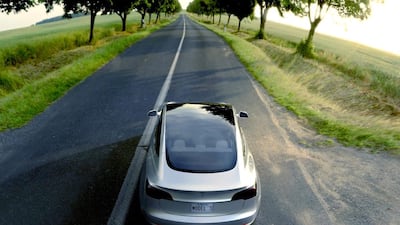The Emirati commentator Sultan Sooud Al Qassemi recounts the tale of a Gulf friend who had bought a Tesla electric car to be environmentally friendly. Asked where he serviced it, he replied: “I fly it to LA”.
Tesla’s new Model 3 went on pre-order at the end of last month and quickly racked up huge interest, with orders passing 250,000 by Sunday last week. Electric cars are not yet common sights on Gulf streets, but Tesla’s pre-order form gives the UAE as an option, the only Middle East country to be so favoured.
The Model 3 will offer almost 350 kilometres of range on a charge, which takes an hour, and goes from 0 to 100 kilometres per hour in under six seconds. Quiet and producing no local air pollution, it is pitched as an “affordable” electric car at US$35,000, although transport costs to the UAE may add to this.
Tesla’s figures may be over-hyped – the “sales” refer to customers who put down a $1,000 refundable deposit for the vehicle, which is to start production late next year. Given the strength of demand, the company will have to expand production capacity rapidly. A quarter of a million orders, even if all fulfilled, represent about 1.5 per cent of the US annual light vehicle market.
On a rough comparison with Dubai prices for electricity and petrol, it would cost a driver Dh5.60 to drive a Tesla Model 3 for 100km, assuming they were paying the top Dewa rate. In comparison, the same distance in a Honda Civic would cost Dh10.40 in petrol. However, a new Honda Civic costs about half as much as the Tesla.
A Tesla driver might recoup the extra cost over a 10-year period in the United Kingdom, where taxation takes the petrol price to Dh6 per litre, four times as much as in the UAE. Battery costs continue to fall, but motorists in the UAE will have to be motivated by fashion or environmental awareness rather than cold economics.
Electric car uptake is encouraged in some countries by tax breaks and other perks, such as free parking or exemption from London’s congestion charge. But if electric vehicles enter the mass market, these incentives will inevitably have to be phased out. Governments will also need to replace their revenue from fuel taxes in some way. And limited range and lengthy charging times will continue to deter longer-distance drivers.
Nevertheless, whether it is the Model 3 or one of its competitors, such as the Nissan Leaf, the BMW i3 or the Chinese BYD e6 that takes the lead, electric cars will be an increasingly common sight on the world’s roads.
Attention to climate change is part of the attraction, but electric vehicles will cut emissions only if they use a large share of electricity from zero-carbon sources, such as nuclear or renewable power. Indeed, in countries burning a lot of coal, including China and Australia, battery vehicles can indirectly release more carbon dioxide than an efficient conventional or hybrid car.
For oil-importing countries, electric cars offer lower dependence on volatile fuel prices and possibly vulnerable supplies. They also ease growing worry about traffic pollution in cities such as London and Paris – not to mention developing-world megalopolises such as Beijing and Delhi. In future, smart grids could recharge batteries from surplus renewable energy and self-driving cars will look for a nearby charging point.
The electric car boosters are over-hyping the short-term potential. But Opec, seeing only a 1 per cent global market share for electric vehicles in 2040, is in danger of being complacent on the long term. Oil exporters should lay plans now to cope with this long-term threat to their business and economies.
Robin Mills is chief executive of Qamar Energy and author of The Myth of the Oil Crisis.
business@thenational.ae
Follow The National's Business section on Twitter


